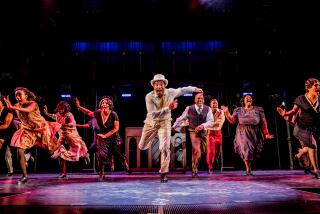âDriving Miss Daisyâ: More Trip Than Destination : Theater review: Simple staging stresses the gradual evolution of relationships against a background of personal and historic events.
GARDEN GROVE â Daisy Werthan, an elderly, white Jewish woman, wants her independence, even though she canât drive anymore.
Boolie Werthan, her son, wants to hire a driver for his mother.
Hoke Coleburn, an experienced black driver, wants a job.
The old, tried-and-true rule of dramatic writing--determine what your characters want--is pure and simple in Alfred Uhryâs âDriving Miss Daisy.â In an uninterrupted series of short scenes, Uhry traces this triangle of mutual aid in a changing South from 1948 to 1973, without ever forcing the social metaphor of black-white integration. What Uhry wants is for us to just take in this tale of friendship.
That suggests a leisurely pace, which is what the play receives in a revival at the Garden Grove Community Theatre. The gradual unfolding of lives, the sometimes funny, almost absurd ways people as unlike as Daisy and Hoke connect, are the key values in director Michael Rossâ staging.
The values find their keenest expression with George Norment as a quietly patient and droll Hoke, who finds himself in the middle of a battle of wills.
Hoke is pure blue-collar, instinctively loyal to his employer (Boolie, not Daisy) and absolutely certain of the best way to get the job done. Normentâs Hoke is at peace with himself and requires a lot to bring him to the boil of anything resembling anger. This is a fine, shaded performance of what could be a stick figure.
*
If Norment has any problem, itâs that he doesnât have enough to play off of with Louise Tonti as Daisy. Because he has dug his fingers deeper into the mulch of his role than she has hers, thereâs a slight imbalance in their interaction.
Tonti doesnât convey in nearly strong enough terms either Daisyâs bitter surrender of pride to reality (the very idea that she needs a driver!) or her sharply Southern sense of class and color differences.
Theyâre not missing in Tontiâs portrayal, but theyâre under-expressed, taking a good deal of juice out of Uhryâs human comedy. With Tonti, we get the skillfully created illusion of aging and an elderly womanâs upset of a private life reorganized for her. What we donât get is Daisyâs stern spine, the side of her that makes Boolie roll his eyes.
*
Alas, Howard Liebgot rolls his eyes a bit too much as Boolie and generally goes for cartoonishness from first to last. Lapsing between quasi-New England and quasi-Georgian accents, Liebgot is the only one in Rossâ cast who appears influenced by the movie version: Thereâs a clowning, Dan Aykroyd-ish excess in him that breaks the tone of this show.
That tone is generally thoughtful, as typified by the intelligent series of between-scenes slides (care of Christopher Knutson) depicting key events of the â40s, â50s and â60s.
Because of this flashing history, the actors donât have to play up such charged moments as Daisy clumsily inviting Hoke to hear Martin Luther King Jr. speak or Hoke informing Daisy that her temple has been bombed. Instead, history flashes on the actorsâ faces: Normentâs, as Hoke compares the bombing to a memory of a lynching; Tontiâs, as Daisy thinks back on the Holocaust.
In âDriving Miss Daisy,â itâs never the big issues that dominate, but the little moments between people who grow to depend on each other. Too facile by half, and too full of short scenes where longer ones would be better, Uhryâs character study is nevertheless a good assignment for good actors. At Garden Grove, itâs a pass all the way.
* âDriving Miss Daisy,â Garden Grove Community Theatre, 12001 St. Mark St., Garden Grove. Friday-Saturday, 8 p.m. Ends Saturday. $9-$10. (714) 897-5122. Running time: 1 hour, 30 minutes.
Louise Tonti Daisy Werthan
George Norment Hoke Coleburn
Howard Liebgot Boolie Werthan
A Garden Grove Community Theatre production of Alfred Uhryâs play. Directed by Michael Ross. Lights: Lee Schulman. Set: Ross and Philip Weitzman. Slides: Christopher Knutson.
More to Read
The biggest entertainment stories
Get our big stories about Hollywood, film, television, music, arts, culture and more right in your inbox as soon as they publish.
You may occasionally receive promotional content from the Los Angeles Times.










